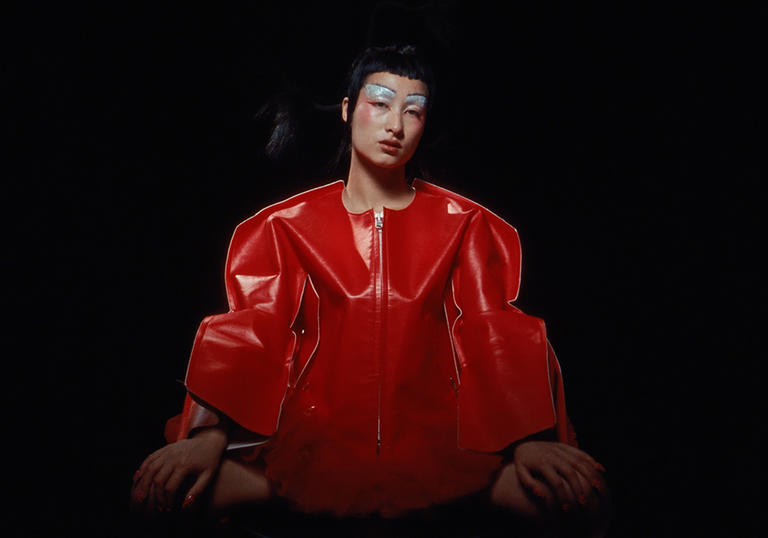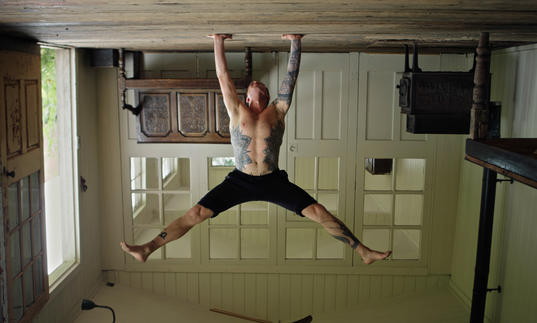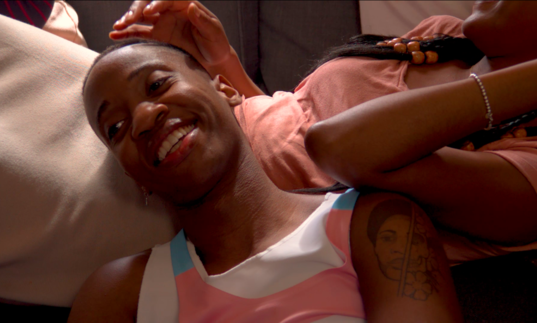Commissioned at the start of 2020 and produced throughout lockdown, Inside Out Shorts is a series of films exploring the relationship between our inner lives and creativity, produced in collaboration with The Smalls.
Can you introduce your film?
As a woman of interracial immigrant heritage in Britain today, there are many intersecting battlegrounds on which you struggle to establish your identity: you are ‘a woman in a man’s world’, you are a ‘foreigner’ in your own homeland, and you are always ‘half’ of something rather than a ‘whole’. Like A Fish Out Of Water is a film that looks at representation with this in mind. It’s about the struggles of entering new social spaces that people like you haven’t historically occupied, whilst on a personal level you are still struggling to even ‘occupy’ yourself.
The commission was originally part of Inside Out, a season exploring our inner lives and creativity and how art can help us better understand ourselves and empathise with others’ experience of the world. How did your film respond to these ideas?
The film is an exploration of the ‘fish out of water’ phenomenon experienced by a woman of interracial immigrant heritage in Britain. For me, a key hallmark of this is that your ‘self’ is constantly questioned - whether intentionally or not - not just by strangers but your peers, and this takes its toll. I have always wanted the opportunity to work with facades and prosthetics in my film work and in many way this is because, it’s the best way I could make manifest a phenomenon that’s going on internally, hence bring the inside out.
When you’re an interracial immigrant kid, you can’t ‘go back where you came from’ even if you tried - should you split into two, three or more parts? I experience all these things as someone born in Britain, but with a Chinese Malaysian mother and an Iranian father, and who has crossed class and social divides: you are always struggling to find people who look or ‘are’ like you, there is no true place you look like you can ‘belong’, and you are always battling the inherent misogyny that still runs deep in society. It’s a blessing as you to get to share in so many cultures, but also bears the weight of a curse - in that other people rarely see themselves mirrored in you.
Even today, as people push forward in film, art, literature, and fashion to represent themselves, their communities, their stories - as a filmmaker I start to question whether people see my voice as relatable. Do I represent my culture? What is my culture?
Therefore, I made this film with characters who are simultaneously recognisable and familiar, and also alien and unknown. Who go from idols to imposters in the blink of an eye. Who become so uncomfortable they cannot even bear the weight of their own skin, if it’s right to even call it theirs, since they are literally masked in constructed facades. They are ultimately revealed to be shades of the same single woman, to represent the many struggles of identity a women of interracial immigrant heritage is grappling with. It is reflective at least of much of the existential drama that takes place in my own head on any given day, and I can only hope that viewers find something of themselves in it too.
I start to question whether people see my voice as relatable. Do I represent my culture? What is my culture?
Can you explain the process behind the making of your film?
I started with words that helped to capture the emotional experience that we’d be trying to convey in the piece. A fish out of water, claustrophobia, purgatory, walls closing in, suffocation, restraint, masked, hidden. This list is what I took to each member of the team, and were the words that sought to hold everything together.
The first port of call was the composer, Matt Huxley. As a base reference we looked at the Eraserhead score, and from there it set the mood and tone of the film. We were keen on mixing melody with natural sounds, in order to try and create this awkward situation where you have them competing with one another to mirror the internal world of the characters, and it was aided in the final mix by our sound designer Guy Chase.
The design team were key to the construction of the characters. I shared scripted biographies that I’d written for the characters of ‘Martin’ and ‘Lian’ and over the course of discussions with Grace Ellington on make up and SFX, Claire Moore on hair and wigs, and Neesha Champaneria on costume, we pulled together references and they came to life.
For the shooting approach, the key was to lean into the theme of ‘all is not what it seems’, and working with colourist Tim Smith and cinematographer Isaac Eastgate we knew that shooting on 35mm would help give us this quality, and we looked at the lighting in 60s horror films such as Psycho, Carnival of Souls and Eyes Without A Face. The idea was to have the characters sitting in this black void that could simultaneously mimic a photographer’s studio but also, a void, a space that was ‘not of this world’.
For a film about existential struggles, I did not ultimately want words or testimonials, but to just allow physicality to convey these things. Naomi our performer is a trained dancer as well as an actor, and when we spoke together about our experienced being mixed, I knew she understood what I was trying to convey, and she developed a physical language for each of them that she brought to set.
It was an added blessing to work throughout with both Aya Kaido as producer, and Luke Tierney as our Exec - both of whom also share in their own experiences an understanding of being mixed.
What impact did COVID-19 have on production? What was your experience creating a film in these strange conditions?
In terms of the production, we did have to simplify our shooting approach and shot list to ensure we could film safely with COVID-19 but still get everything we needed on our shoot day. It slowed down our work processes and communication wearing masks and maintaining distance on set. I had to work remotely with the editor, Alexandre Do, which was a first for me, and it made me realise how you can’t really find a digital match for being in the same room as someone - but we definitely made it work!
What impact do you think Covid-19 will have on cinema in the near future – for audiences and filmmakers?
I don’t quite know what impact Covid-19 will have in the near future, especially given the industry was already struggling with accommodating artists. I just hope that the mission to decolonise film and practice anti-racism in the industry remains imperative. There is an opportunity for us to build that into the very essence of new approaches to cinema.



